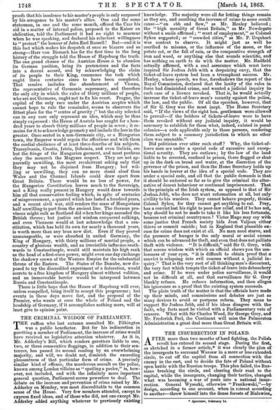THE CRIMINAL WISDOM OF PARLIAMENT. T HE ruffian who last autumn
assaulted Mr. Pilkington was a public benefactor. But for his indiscretion in garotting a member of Parliament, the increase of crime would have received no legislative attention whatever. As it is, Mr. Adderley's Bill, which renders garotters liable to one, two, or three consecutive floggings, in addition to their sen- tences, has passed its second reading by an overwhelming majority, and will, we doubt not, diminish the exceeding pleasantness of that particular form of crime. A precisely similar kind of offence, the murderous assault on the police, known among London villains as "spoiling a peeler," is, how- ever, not included, and with the infinitely more important general question, Parliament seems powerless to deal. The debate on the increase and prevention of crime raised by Mr. Adderley on Monday, was most discreditable to the common sense of the House. Very few members attended, except to express fixed ideas, and of those who did, not one except Mr. Adderley added anything whatever to previously existing knowledge. The majority were all for letting things remain as they are, and ascribing the increase of crime to some occult cause—" an ebb and flow," as Mr. Henley believed ; the "high morality of Great Britain," as Mr. Newdegate without a smile affirmed ; "want of employment," as Colonel Sykes suggested; or "crowded cities," as Mr. P. Urquhart was content to observe. It might just as well be ascribed to miasma, or the influence of the moon, or the, potato rot, or the fall of rain, or the comparative strength of iron and wood, or anything else that sounds scientific, and has nothing on earth to do with the matter. Mr. Hadfield actually affirmed, with a cool assurance which must have inspired Sir Joshua Jebb with a despairing envy, that the ticket-of-leave system had been a triumphant success. Mr_ Henley, whose speech, we fear, foreshadows the report of the Royal Commission, declared that the laxity of the rules in force had diminished crime, and wanted a judicial inquiry in each case of a licence revoked. That is, he would actually increase the ticket-of-leave man's security against the police,. the law, and the public. Of all the speeches, however, that of Sir G. Grey was the most inept. The Home Secretary said, "If the views of the right hon. gentleman were allowed to prevail—if the holders of tickets-of-leave were to have them revoked without any judicial inquiry, it would be necessary to establish for them what, indeed, existed in penal colonies—a code applicable only to those persons, rendering them subject to a summary jurisdiction to which no other class was amenable."
Did politician ever utter such stuff? Why, the ticket-of- leave men are under a special code of excessive and excep- tional severity. They are outlaws ; by the law of the land liable to be arrested, confined in prison, there flogged or shut up in the dark on bread and water, at the discretion of the governor of the prison, and then the Home Secretary holds up his bands in horror at the idea of a special code. They are under a special code, and all that the public demands is that it should be enforced so far as to give the criminal the alter- native of decent behaviour or continued imprisonment. That is the principle of the Irish system, as opposed to that of Sir Joshua Jebb, who does not want reformation at all, but only, civility to his warders. They cannot behave properly, thinks Colonel Sykes, for they cannot get anything to eat. Pray, has a convict lost his right to poor-law relief, and if he has not, why should he not be made to take it like his less fortunate, because not criminal countrymen ? Victor Hugo may say with some justice that French society bids Jean Valjean eithert thieve or commit suicide ; but in England that plausible ex- cuse for crime does not exist at all. No man need starve, and the pressure of hunger is the only moral or social excuse which can be advanced for theft, and even that does not palliate theft with violence. "It is difficult," said Sir G. Grey, with that serene wisdom with which an official shows you the use- lessness of your eyes, "it is difficult to obtain proof that a convict is relapsing into evil courses without a judicial in- quiry." That is the very root of all thinking men's discontent, the very fact which tempts the ticket-of-leave into debauchery and crime. If he were under police surveillance, it would not be difficult at all, and that surveillance Sir G. Grey blankly refuses. He refuses information, and then alleges. his ignorance as a proof that the existing system succeeds. The plain truth of the matter is that the officials have made up their minds, and commissions and debates are just so many devices to avoid or postpone reform. They mean to support Sir Joshua Jebb, and if his ideas disagree with the facts, why facts must be visited with a Parliamentary vote of censure. What with Si- Charles Wood, Sir George Grey, and Mr. Frederick Peel, the Continent will miss the Palmerston Administration a great deal more than Great Britain will.






























 Previous page
Previous page